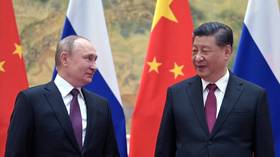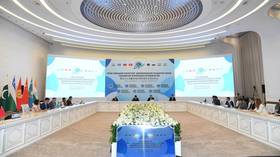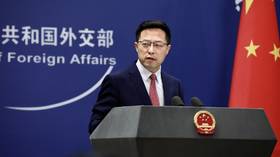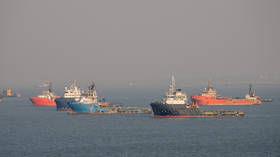Timofey Bordachev: Russia is a European country, but the West's hybrid war has forced it to turn to Asia

For Russia, with its unique geopolitical position, it is fundamentally difficult to determine the geographical priorities of its external relations. All the more so because the country's enormous natural wealth and ability to fully support itself with resources make it unnecessary in principle to consider external relations as a vitally important part of its own development strategy.
There is no dispute that all of Moscow's foreign policy declarations over the last two decades have contained a ritual indication that the goal of foreign policy is to ensure the country's economic development. However, in practice, the foundations on which the Russian state structure stands mean the sincerity of these assurances should be taken with a pinch of salt.
In reality, Russia – like its main geostrategic adversary the US – is one of only two countries in the world that can survive, at least in the basic senses, by relying entirely on its domestic resources.
Despite assurances about the importance of foreign economic relations, Moscow sets the true priorities of its foreign policy based not on which opportunities the external environment can provide, but rather on the dangers it can pose to its ability to manage this bounty.
The result is a foreign policy oriented towards repelling threats in the first instance, and seizing opportunities in the second. And it has to be admitted that it is this insurmountable problem that has confronted many of Russia’s diplomatic undertakings throughout recent years, foremost among which is the pivot to the East, a strategy formulated a decade ago by domestic thinkers and backed up by statements at the highest level.
The purely materialistic nature of this policy initially had great difficulty interacting with the Russian foreign policy tradition and, more importantly, the system of prioritisation. Attempts to convince elites of the need to intensify relations with Asian countries on the basis that this would bring substantial material benefits, faced an objective obstacle – there was no need to try hard in the western direction. This was because material benefits from there came easily, by comparison, relying on the links established over hundreds of years with other major European players. As a result, as of 2019, about 80% of investments in Russia’s Far East were of domestic origin. This region, which is larger than the European Union, has only about 7 million people and is politically centred on the cities of Vladivostok and Khabarovsk.
Perhaps because of its economic limitations, the eastward pivot strategy in concrete terms has not progressed beyond establishing truly strong ties with China, with which Russia has now begun to address the really crucial issues of the international order. In all other respects the Eastern pivot has remained an important rhetorical but weakly realised field for the Russian state. Over the past ten years, however, Moscow has significantly expanded its presence in various Asian international formats, increased its level of participation in various intergovernmental forums, and begun to think more about the East and understand its place in its own foreign policy system.
In turn, ties with China are also difficult to see solely as a product of intensified interactions on the Asian front in the last ten years. The relationship between Moscow and Beijing is strategic in nature, with a shared vision of a more equitable international order that is not dominated by a narrow group of states.
Also, Russia and China share responsibility for the stability of a vast part of Eurasia. Bilateral trade and economic relations are developing with the understanding that at some point the two states will indeed have to jointly oppose attempts by the US and its allies to regain control of the global economy and politics.
While acknowledging that this is the closest interpretation of the nature, content and results of Russia's turn to the East, we cannot ignore the potential impact on policy of the ongoing political and military conflict in Europe. Moreover, since its first weeks, most observers have argued that a de facto break with the West would inevitably lead to a strengthening of Russia's ties with non-Western states, of which the Asian countries are the most important in terms of economy and development.
Against the backdrop of massive economic warfare measures launched against Moscow by Western countries in 2022, it is Asia that has emerged as the most important buyer of traditional Russian exports, a source of technological products and a priority trade and economic partner. Many have even said that developing ties with China and the rest of Asia should "replace" Russia’s traditional partnerships in the West.
In other words, the conflict – in fact, hybrid warfare – between Russia and the US along with its European allies, could be seen as a condition that would make the pivot to the East no longer a choice but a necessity, forcing Moscow to take it truly seriously. This is a rather new situation and discussion for Russia, as it has never in its history had to address the dependence of internal sustainability on interaction with one or another of its external partners. The extent to which this is actually the case remains to be seen. But several assumptions can already be made that are directly related to the significance of Russia's relations with Asia in the coming years.
First, relations with China and (especially) other Asian states are not the way to solve existential problems, even taking into account that cooperation with partners outside Europe in the field of energy will be an important factor in the future sustainability of Russian budget revenues, and maintaining Russia's presence in the global economy, from which the US and its allies are trying to exclude it.
This is all the more likely given that countries such as Japan and South Korea are much less likely to be pressured by the US not to trade with Russia, compared to their European equivalents. Given the growing confrontation with China, it is not in Washington's interest to weaken its Asian allies or to make them too dependent on American aid.
Secondly, the key tasks of national development will have to be solved by Russia itself, without the kind of reliance on external sources of technology we have seen previously, let alone finance. The coming era will require a much greater degree of de facto sovereignty and, in a sense, a capacity for limited autarky. For all the importance of links outside the West, therefore, Russia cannot consider simply reorienting itself from one direction to another while retaining its historically established strategy of dependence on external sources of development.
To give an example, it will have to start building its own long-haul aircraft again, instead of relying on finished products from Boeing and Airbus.
Thirdly, it should be taken into account that even the most active ties in Asia cannot supplant relations with the states of the Islamic world, neighbouring countries and even within Europe, where also not everyone is determined to erect walls on its eastern border.
Russia's geopolitical position cannot be changed by a single military-political conflict in one direction. Not to mention that from a historical and cultural point of view, it will always be difficult for Russia to build engagement in Asia similar in scale and spirit to that in the South and the West.
To summarise, in the current context, relations with Asian countries are becoming a necessity rather than a choice. However, this doesn’t mean choosing a complete change in the most important aspects of national foreign and foreign economic policy. Rather, it has an important tactical value and, with due diligence on our part, could further lead to a more significant Russian presence in world affairs, the centre of which is increasingly shifting to the east.
The statements, views and opinions expressed in this column are solely those of the author and do not necessarily represent those of RT.















